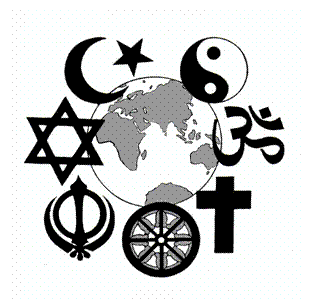Lesson 26: Spirituality, Religion, and Old Age
Attention

Many faiths and religions exist in the world...the contrast between Religion and Spirituality is central to our understanding of their role in old age.
Learning Outcomes
Upon completion of this lesson's material, students will be able to:
- Identify the role that religiosity plays in mental health work
Teaching
Read Chapter 10 in Vaillant
"Hope" and "Love" are central to lifespan development...but what about "Faith"? Does "Faith" increase at the close of life?
It seems that early in life we need the certainty of a "Higher Power" to help us tie the knots of our identity together. As we age, however, we also seem to become more tolerant to ambiguity and uncertainty. According to the study by Vaillant..."Faith" was not necessarily associated with successful aging...not nearly as much as "Love" and "Hope".
Vaillant draws a hard line between "Spirituality" and "Religion" and by his own admission he sees them as more different than they may really be. It is clear that he favors "Spirituality" as well...most of what he has to say about religion is pretty negative.
Religion, he says, plays a role in our early life in forming the foundation of our identity...as we age, we begin to be able to hear the other stories of other people in other religions and see the truth in those metaphors...to see that the mystery of our existence is multifaceted and God cannot seem to be bound by one tradition or another.
However, from an individual point of view...tradition may be a central aspect of identity through the lifespan. While we develop our spiritual selves by focusing on the universal values that all religions share, we might begin to reassess the traditions and dogma of our "old religion" and see it's symbolism...after all, that is where it originated from!
Editorial My own personal journey has been much like this. I was raised in the Catholic Church. It was a very positive experience for me, though I'm certain that others have not been so lucky. My home town pretty much had one church my entire childhood and we were involved in it and it was involved with us. Leaving the town I adventured into other faiths...some very far from my origins. Yet, I always thought fondly of the "Mass" and the "Eucharist" and the gold and beautiful buildings...it seemed solid to me, solid like the kind of God I wanted to know...reliable and able to withstand the forces of the world bound to destroy me. At this point in my life I find myself drawn back to these Catholic traditions. I know the faults and certainly the history of the Catholic Church...but I've come to know and feel it's solid ground again...it's stead pace in a world caught up in rapid change and individualism. More than anything, the Catholic Church traditions remain very "Eastern". The Protestant churches of today (most of the Christian churches you may hear of arise from the Protestant Reformation) have a highly "individual and personal relationship with God" principle...with personal salvation as a primary aim. While I might agree that this is very important it drowns the light of our command to serve others...do first love and then do unto others as we would have them do unto us...the focus on individual salvation can sometimes digress into a rather self-centered mess! I'm aging though...I have a very broad perspective on different faiths and I do not believe that God can be enclosed in any box of our making. I guess I'll find out. |
It is telling in Vaillant that there is a relationship between religion and depression...at the same time, religion also serves to provide comfort to the lonely. The reading tells and interesting tale of how one person stopped going to church when they had their 4th child and started again 30 years later...seemingly in line with the need for additional social supports. Perhaps THAT is the value of religion, if it does not serve the spiritual purposes?
Lastly, on P. 273 begins the story of Billy Graham...his was a voice heard a lot in my early life...the sound of his sermons filled the house on Sundays (somewhere inbetween the pork roast dinner and baseball)...this a great story of a very strong spiritual life.
Assessment
Lesson 26 Discussion
Working with the elderly we are bound to confront the issues of religion and spirituality. If we consider that at each stage in our development we look to, and anticipate, the next stage...in late life the next stage is death...and for some, a life after death. Consider the elderly people in your own life and contrast their views on death and "what happens after" to your own. In what ways does this contrast influence you work as a mental health worker?